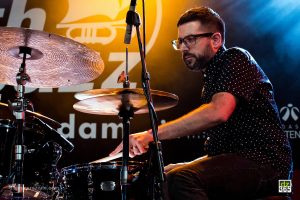But tonight’s gig, in support of the new album Jersey is billed as a different turn for his career. As if to emphasise the fact, the first number begins with no sound from the leader’s drums at all: a limber, curling unison from saxophone and piano unfolds in the expectant hush, until Giuliana enters, tapping the snare with his fingers over an insistent single-note bassline.
The dynamic slowly builds, as the sax peels off into a flurry of spiralling phrases. Giuliana hunches over the kit, completely absorbed in the restless chattering polyrhythms, hands and feet ever busier with the rising tide, leaning into each unexpected, sudden rhythmic bomb. He and bassist Chris Morrissey skirt around the implied pulse as Fabian Almazan’s piano builds up from whisper-quiet to cascading intensity and the whole band radiate a fiercely geeky energy.

In a surprise move, Giuliana leaves the kit and sits down at the back of the stage, head in hands, leaving Jason Rigby’s tenor sax to play a soft, almost pastoral melody over a droning arco bass and rumbling piano. Then he’s back on the stool, and they’re off into a hip three-four swing that suddenly descends again into near-silence, punctuated by a few carefully positioned bass phrases, before Rigby takes flight again, his awesome fluidity complemented by his soft, clear tone. Both Rigby and pianist Almazan share a similarly remarkable command of language, at once capable of great abstraction and immense tenderness. An extended piano solo goes from mutated blues phrases and hints of expansive Peterson or Shearing chording into dense tonal clusters and shimmering, cimbalom-like textures, all delivered with a sure and subtle touch. Morrissey takes a feature on his bass, playing it as though it’s a folk instrument, his strums and simple pentatonics accompanied by Giuliana’s taps on the snare and slaps on his thigh.
The quartet are superbly balanced: the almost supernatural empathy and the compatibility of their voices allows them to range freely across the open structures of the compositions, using silence as a potent musical force, pushing the dynamic almost to the lowest limit of audibility before rising again, diverging then miraculously coming back together for a short, gnomic phrase or unexpected accent. The second set pays increasing dividends as the band set up a cycle of simple minor chords, like a still pool of water, with Almazan and Giuliana creating ripples of dissonance on the surface and Rigby soaring aloft on butterfly wings. His dazzling flight seems like a clear winner for solo of the evening, until Almazan equals it with another effortlessly sustained flow of ideas, with accents of everything from free-improv to calypso, and bass and drums spin an intricate filigree of rhythm out of which Giuliana finally pulls the astonishing, climatic drum solo that everyone’s been waiting for. After this payoff, there’s a version of Bowie’s ‘Where Are We Now’ as an elegiac coda for the evening’s journey; an outstanding performance of a unique and convincingly realised musical vision, created by four distinctive and wholly compatible players. No wonder the leader looks quietly triumphant.







More Stories
CD review: George Benson – Dreams Do Come True: When George Benson Meets Robert Farnon – 2024: Video, CD cover
The band was tight as ever. The Warren Haynes Band cuts loose: Video, Photos
Interview with Alvin Queen: Feeling Good – I heard these tunes played by … Video, new CD cover, Photos